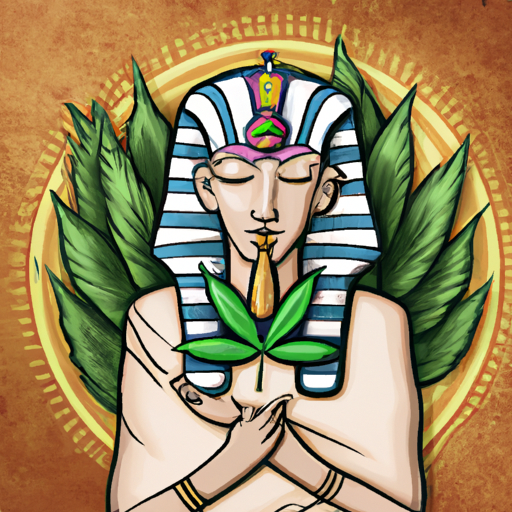Welcome to a world where cannabis isn't just a recreational drug, but a powerful tool for healing and self-discovery. In this article, we will delve into the fascinating realm of cannabis and its profound impact on our health and well-being. From its ancient origins as a medicinal herb to its modern-day resurgence as a natural medicine, we will explore the many facets of this magical plant.
In the first section, "The Healing Power of Cannabis: Unlocking the Medical Benefits of Weed in New York," we will take a closer look at the medical potential of cannabis, particularly in the context of New York. With the legalization of medical marijuana in the state, patients are now able to access the therapeutic benefits of weed in treating a wide range of conditions. We will delve into the various ways in which cannabis can be used medicinally and the groundbreaking research being conducted in this field.
Next, we will embark on a journey through time in "Cannabis Through the Ages: Exploring the Ancient Roots of Medicinal Ganja." Cannabis has a rich history dating back thousands of years, with evidence of its medicinal use found in ancient civilizations across the globe. We will uncover the wisdom of the ancients and how they harnessed the healing properties of this sacred plant, shedding light on the enduring legacy of cannabis as a medicine.
But cannabis is not just a plant for the body; it also holds immense spiritual significance. In "Cannabis as a Spiritual Tool: Tapping into the Magical Properties of Marijuana," we will explore the mystical aspects of marijuana and its role in various spiritual practices. From shamanic rituals to meditation and self-reflection, cannabis has been used as a catalyst for spiritual growth and connection throughout history. We will delve into the profound experiences and insights that can be gained through the intentional use of this sacred herb.
In the final section, "Cannabis: A Natural Medicine for Optimal Health and Well-being," we will examine the broader implications of cannabis as a natural medicine. Beyond its specific medical applications, cannabis has the potential to enhance overall health and well-being. We will explore the various ways in which cannabis can support our physical, emotional, and mental well-being, offering a holistic approach to healing and thriving.
So, buckle up and get ready to embark on a journey that will challenge your preconceptions and open your mind to the incredible potential of cannabis. Whether you are a seasoned cannabis enthusiast or new to the world of weed, this article will provide you with a comprehensive understanding of the healing power of cannabis and how it can contribute to your health and happiness. Let's dive in and discover the wonders of this remarkable plant.
- 1. The Healing Power of Cannabis: Unlocking the Medical Benefits of Weed in New York
- 2. Cannabis Through the Ages: Exploring the Ancient Roots of Medicinal Ganja
- 3. Cannabis as a Spiritual Tool: Tapping into the Magical Properties of Marijuana
- 4. Cannabis: A Natural Medicine for Optimal Health and Well-being
1. The Healing Power of Cannabis: Unlocking the Medical Benefits of Weed in New York

The Healing Power of Cannabis: Unlocking the Medical Benefits of Weed in New York
When it comes to the healing power of cannabis, it's hard to deny the profound impact this plant has had on countless individuals. From ancient civilizations to modern-day societies, cannabis, also known as weed, ganja, or marijuana, has been revered for its medicinal properties.
In the state of New York, the use of cannabis for medical purposes has gained significant recognition and acceptance. Medical cannabis has been legalized to help individuals suffering from various conditions, including chronic pain, epilepsy, multiple sclerosis, and PTSD, among others. This move has opened up a world of possibilities for patients seeking alternative treatments.
The use of cannabis as a medicine is not a new concept. In fact, its roots can be traced back thousands of years to ancient civilizations. The ancients recognized the therapeutic properties of this plant and incorporated it into their medical practices. From the spiritual rituals of the Egyptians to the medicinal traditions of the Chinese, cannabis was considered a valuable herb for healing.
What makes cannabis so unique is its chemical composition. The plant contains over 100 compounds called cannabinoids, with two main players being THC (tetrahydrocannabinol) and CBD (cannabidiol). THC is responsible for the psychoactive effects commonly associated with marijuana, while CBD offers potential therapeutic benefits without the "high" feeling.
Research has shown that cannabinoids interact with the body's endocannabinoid system, a complex network of receptors found throughout the body. This system plays a crucial role in regulating various physiological processes, including pain, mood, appetite, and inflammation.
Medical cannabis has been found to provide relief for chronic pain, a condition that affects millions of people worldwide. Studies have shown that cannabinoids can help reduce pain and improve quality of life for individuals suffering from conditions such as arthritis, fibromyalgia, and neuropathic pain.
In addition to pain management, cannabis has shown promise in treating epilepsy, a neurological disorder characterized by recurrent seizures. CBD, in particular, has gained attention for its anticonvulsant properties. It has been found to reduce the frequency and severity of seizures in individuals with certain forms of epilepsy.
Moreover, cannabis has been explored for its potential benefits in mental health. Research suggests that cannabinoids may help alleviate symptoms of anxiety, depression, and post-traumatic stress disorder (PTSD). These findings are particularly significant in a society where mental health conditions are prevalent.
The medical benefits of cannabis extend beyond physical and mental health. This plant has been recognized for its anti-inflammatory properties, making it a potential treatment for conditions such as Crohn's disease, multiple sclerosis, and rheumatoid arthritis. Cannabis has also been studied for its potential anti-cancer properties, with some evidence suggesting that cannabinoids may inhibit tumor growth and induce cancer cell death.
In New York, the medical use of cannabis has provided hope and relief for countless individuals. Patients have access to a variety of cannabis products, including oils, tinctures, capsules, and vaporizers, allowing them to find a method that suits their needs. However, it's important to note that medical cannabis should be used under the guidance of a healthcare professional to ensure safe and effective use.
As we continue to unlock the potential of cannabis as a medicine, it's crucial to recognize the ancient wisdom that has guided us to this point. The healing power of cannabis has been celebrated for centuries, and now, with the advancements in research and legalization, we have the opportunity to harness its magical properties for the betterment of our health and well-being.
So, whether you're in New York or anywhere else in the world, remember that cannabis is not just a recreational substance but a powerful tool for healing. Embrace the ancient wisdom, explore the medical benefits, and let this magical plant guide you on a journey towards optimal health and thriving.
2. Cannabis Through the Ages: Exploring the Ancient Roots of Medicinal Ganja

Cannabis Through the Ages: Exploring the Ancient Roots of Medicinal Ganja
Throughout history, cannabis has been revered and utilized for its medicinal properties by various ancient civilizations. From the spiritual practices of ancient India to the traditional healing methods of the Chinese, cannabis, also known as ganja or weed, has played a significant role in promoting health and well-being.
In ancient India, cannabis held a sacred place in religious and spiritual ceremonies. The plant was considered a gift from the gods and was often used for its psychoactive effects to induce a state of enlightenment and inner exploration. The ancient Indians believed that cannabis had the power to connect individuals with the divine and enhance their spiritual experiences. It was commonly used by yogis and ascetics to aid in meditation and achieve a heightened state of consciousness.
Moving eastward, we find the ancient Chinese recognizing the medicinal properties of cannabis. The Chinese pharmacopoeia, dating back thousands of years, mentions the therapeutic benefits of marijuana. The herb was used to alleviate pain, reduce inflammation, and treat various ailments. The Chinese believed in the concept of balance and harmony within the body, and cannabis was seen as a tool to restore that balance. It was commonly used in combination with other herbs to create powerful medicinal concoctions.
As we delve deeper into history, we discover that cannabis was not only used in spiritual and healing practices but also as a form of medicine in ancient Egypt. The Egyptians valued the plant for its analgesic properties and used it to alleviate pain and treat various conditions. The medicinal use of cannabis can be traced back to the Ebers Papyrus, one of the oldest known medical texts, where it is mentioned as a remedy for inflammation and glaucoma.
The ancient Greeks and Romans also recognized the healing potential of cannabis. The renowned Greek physician Hippocrates, often referred to as the father of medicine, prescribed cannabis for a range of ailments, including pain relief, digestive issues, and even childbirth. Similarly, the Romans used cannabis as a medicinal herb, believing in its ability to promote overall well-being and vitality.
Throughout the ages, cannabis has been regarded as a magical and powerful herb with immense healing properties. Its rich history and widespread use in different cultures highlight the enduring belief in its therapeutic benefits. Today, as New York and other states embrace the medical use of marijuana, we can look back at these ancient practices and draw inspiration from the wisdom of the ancients. By exploring the historical roots of medicinal ganja, we can gain a deeper understanding of the potential of cannabis to heal and thrive in our modern world.
3. Cannabis as a Spiritual Tool: Tapping into the Magical Properties of Marijuana

Cannabis as a Spiritual Tool: Tapping into the Magical Properties of Marijuana
When we think of cannabis, our minds often jump to its recreational and medicinal uses. However, this ancient plant has also been revered for its spiritual properties throughout history. From the ancient civilizations of Egypt and India to modern-day spiritual practices, cannabis has been seen as a gateway to higher consciousness and a tool for connecting with the divine.
In many ancient cultures, cannabis was considered a sacred herb and was used in religious ceremonies and rituals. The plant was believed to have the power to open the mind and expand consciousness, allowing individuals to connect with the spiritual realm. It was seen as a tool for achieving enlightenment, gaining insight, and deepening one's spiritual journey.
One of the key aspects of cannabis as a spiritual tool is its ability to induce a state of relaxation and introspection. The plant's psychoactive compounds, such as THC, can alter perception and enhance sensory experiences. This heightened state of awareness can be a catalyst for spiritual exploration, allowing individuals to delve into their inner selves and gain a deeper understanding of their place in the universe.
Moreover, cannabis has been associated with healing and transformation in spiritual practices. It is believed to have the ability to release emotional blockages, promote introspection, and aid in the healing of trauma and past wounds. By creating a sense of calm and relaxation, cannabis can help individuals let go of negative energies and emotions, allowing for a more profound spiritual experience.
The magical properties of marijuana also extend to its role in enhancing creativity and inspiration. Many artists, musicians, and writers have credited cannabis with unlocking their creative potential, providing them with a unique perspective and opening the doors to new ideas and artistic expressions. The plant's ability to stimulate the imagination and break down mental barriers has made it a beloved companion for those seeking artistic inspiration and spiritual growth.
It's important to note that the use of cannabis as a spiritual tool should be approached with intention, respect, and moderation. Like any other plant medicine, it is crucial to understand its effects, dosage, and potential risks. Additionally, it is essential to ensure that cannabis is used in a legal and responsible manner, adhering to the regulations and guidelines set forth by the respective governing bodies.
In conclusion, cannabis has long been recognized for its spiritual properties and its ability to facilitate healing, introspection, and creative inspiration. Whether it's connecting with the divine, exploring one's inner self, or unlocking artistic potential, marijuana has been regarded as a powerful tool for spiritual growth and transformation. As we continue to explore the myriad uses of this ancient plant, it is essential to approach its spiritual aspects with reverence and mindfulness, honoring its historical significance and embracing its magical properties.
4. Cannabis: A Natural Medicine for Optimal Health and Well-being

Cannabis: A Natural Medicine for Optimal Health and Well-being
When it comes to natural remedies for optimal health and well-being, cannabis has been gaining significant attention in recent years. This versatile plant, also known as weed, ganja, or marijuana, has a long history of use for both medicinal and recreational purposes. In this section, we will explore the medical benefits of cannabis and delve into its potential as a healing herb.
The ancient use of cannabis as a medicine dates back thousands of years. Cultures like the ancient Egyptians, Chinese, and Indians recognized its therapeutic properties and utilized it for various ailments. In fact, cannabis has been mentioned in ancient texts and scriptures, highlighting its spiritual and medicinal significance.
One of the key components of cannabis that contributes to its medicinal properties is cannabinoids. These are chemical compounds found in the plant that interact with the body's endocannabinoid system, which plays a crucial role in regulating various physiological processes. The two most well-known cannabinoids are tetrahydrocannabinol (THC) and cannabidiol (CBD).
THC is the psychoactive compound responsible for the "high" typically associated with marijuana use. However, it also possesses therapeutic properties that can aid in pain relief, appetite stimulation, and relaxation. On the other hand, CBD is non-psychoactive and has gained popularity for its potential anti-inflammatory, analgesic, and anti-anxiety effects.
Medical cannabis has shown promising results in treating a wide range of conditions. In states like New York, where medical use of marijuana is legal, patients have reported significant improvements in managing chronic pain, reducing nausea and vomiting associated with chemotherapy, alleviating symptoms of multiple sclerosis, and even controlling seizures in epilepsy patients.
But it's not just the cannabinoids that contribute to cannabis's healing potential. The plant contains a rich array of other compounds, including terpenes, flavonoids, and phenols, which work synergistically to provide therapeutic benefits. These compounds contribute to the unique aroma and taste of different cannabis strains and may have their own medicinal properties.
Furthermore, cannabis offers a holistic approach to healing, addressing not only physical ailments but also mental and emotional well-being. Many individuals report a sense of relaxation, stress relief, and improved mood after consuming cannabis in a responsible manner. It can serve as a tool for self-reflection, introspection, and spiritual exploration.
While cannabis shows great promise as a natural medicine, it is essential to approach its use responsibly and with proper guidance. Consulting with a knowledgeable healthcare professional or a medical marijuana specialist is crucial to ensure the safe and effective use of cannabis for therapeutic purposes.
In conclusion, cannabis, with its rich history as a medicinal herb, offers a natural and holistic approach to achieving optimal health and well-being. From its ancient use by the ancients to its recognized medical benefits today, this magical plant has the potential to heal and nurture the mind, body, and spirit. Whether used for pain management, anxiety relief, or simply to promote a sense of wellness, cannabis continues to captivate the attention of both ancient wisdom and modern science.
